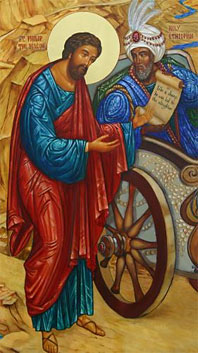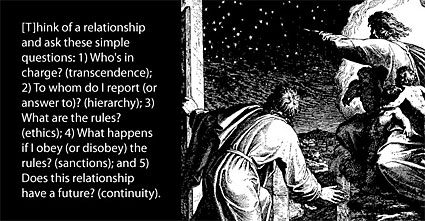Jul
24
2013

Jean flipped one page back and realized he had contradicted himself once again. This was tricky stuff, working out salvation, but at least he was showing his workings. “Oh well,” he thought. “One day they will invent word processors.”
In a post called Baptism Is Not Faith, Shane Lems points out where the Federal Vision guys depart from the “historic Reformed/Presbyterian confessions.” He writes:
Continue reading
5 comments | tags: Baptism, Federal Vision, Reformers, Steve Wilkins | posted in Biblical Theology
Mar
14
2012
 From the recent book by Douglas Bond, pp. 51-53.
From the recent book by Douglas Bond, pp. 51-53.
Knox reluctantly began his preaching ministry when he was pressed int service as a chaplain during the siege of the Castle of St. Andrews. By popular demand, the private tutorials he prepared for his “bairns” developed into public exhortations from the Word of God. As we have seen, he was, in his flesh, a timid, fearing man; “I quake, I fear, I tremble,” he said. But when he opened his mouth to preach, all timidity vanished.
Continue reading
Comments Off | tags: Church History, John Knox, Preaching, Reformers | posted in Christian Life, Quotes
Jan
24
2012

“Rivers of water run down from my eyes,
because men do not keep Your law.” Psalm 119:136
I might bag out [1] the Biblical Horizons crowd for their views on baptism, but otherwise they are giants. They have a hold on Scripture and history that enables them to understand the times.
Rich Blesdsoe recently made the observation that the unbelief which constantly confronts us Western Christians is quite a different animal to the demonism found in other cultures. We don’t suffer the full-scale “possessions” seen in pagan cultures. The rebellion is just as self-destructive, as crazed and zealous, and just as much a “nothing” as the idols of the pagans, but it is a different kind of nothing. What’s going on in our culture?
[This post has been refined and included in Sweet Counsel: Essays to Brighten the Eyes.]
Continue reading
Comments Off | tags: Demons, Ecclesiology, Edwin Friedman, Islam, Postmillennialism, Reformers, Rich Bledsoe | posted in Biblical Theology, The Last Days, The Restoration Era
Nov
18
2009
What was the Reformation?
———————————————————————————
“The unity of Rome is the unity of unbroken Adam and unbroken Saul.
It is a unity that will not go to the cross to be broken and resurrected.
It is a unity that would not confess when confronted by Nathan.”
———————————————————————————
 Have been having some debate with Bryan at “Called to Communion” blog on the nature of the church. Was the Reformation a rebellious schism or did the true church outgrow Rome? No guarantees on my scholarship but here’s some large excerpts that might be helpful or at least thought-provoking. Mike in roman type, Bryan in italic.
Have been having some debate with Bryan at “Called to Communion” blog on the nature of the church. Was the Reformation a rebellious schism or did the true church outgrow Rome? No guarantees on my scholarship but here’s some large excerpts that might be helpful or at least thought-provoking. Mike in roman type, Bryan in italic.
* * * * *
I agree with you that the Church that Christ founded is not “limited to any human institution”; we believe that it is a divine-human institution, because its founder is both divine and human. But its being a divine-human institution does not mean that it is a “merely human” institution, nor does it mean that it is not a human institution. To deny that it is a human institution is, in that respect, to deny Christ’s humanity. It is to assume (mistakenly) that the only kind of human institution there can be is a merely human institution. That’s like claiming that the only kind of human there can be is a mere human, not a divine human.
Before Jesus ascended, He gave the keys of the Kingdom to Peter. Christ still governs the Church, of course, but He does so through those whom He gave authority. That is why it is right for us to “Obey [our] leaders and submit to them, for they keep watch over [our] souls, as those who will give an account.” (Heb 13:17) That would not make any sense if only Christ governed His Church from heaven.
The church that Christ founded was not limited to any human institution as far as a centralised government goes. With the ascension of Christ, the government of worship by men moved from earth to heaven. It is now out of Satan’s reach and thus incorruptible. Local churches, as in Rev 2-3, are frequently assessed by Christ, and either nursed back to health, or, if consistently rebellious, he “snuffs” them out. Whether or not they remain as institutions, they are no longer part of the body – just as the cicada shell of Judaism is today.
* * * * *
Continue reading
Comments Off | tags: Reformation, Reformers, Roman Catholicism | posted in Biblical Theology, The Last Days
Sep
30
2009

Roman Catholics like to remind us Protestants that the Reformation’s sola scriptura has caused unmitigated doctrinal division. Interpretation must be done in community by people who know what they are talking about.
In his talk this week (see previous post Heliocentric Preaching), Doug Wilson humourously described the “just me and my Bible” people who fail to realise that the Bible itself calls us to theology in community. We all need teachers, and the Bible is written the way it is so we are forced into some sort of discipleship. Left alone with our Bibles, we are all Ethiopian eunuchs.
So regarding sola scriptura and interpretive authority, I kind of agree with the Catholics! It has always been something done by the church community.[1]
H O W E V E R . . .
Continue reading
1 comment | tags: AD70, Atonement, Church History, Compromise, Doug Wilson, Ecclesiology, Reformation, Reformers, Roman Catholicism, Tim Nichols | posted in Against Hyperpreterism, Christian Life, The Last Days
Jul
24
2009
 Eric Rauch describes one of the greatest theological discoveries of our time, one which hardly anyone has heard of yet after 20 years.
Eric Rauch describes one of the greatest theological discoveries of our time, one which hardly anyone has heard of yet after 20 years.
by Eric Rauch
One of the enduring Latin phrases of the Protestant Reformation is the impressive sounding ecclesia semper reformans, semper reformanda. In plain English, this means “the church is always reformed and always reforming.” This simple principle is one that is most often forgotten in modern discussions about theology, where a surefire way to end a disagreement is to pull out something written by Luther, Calvin, or even Spurgeon and show that they said much the same thing. Although the Reformers themselves were quite emphatic that they were not the final word (hence the “always reforming”), contemporary Christianity seems to be convinced that dead theologians should be the authoritative standard of interpretation.
Continue reading
Comments Off | tags: Covenant Theology, Ray Sutton, Reformers | posted in Biblical Theology
May
17
2009
Doug Wilson on Craig Blomberg’s review of N. T. Wright’s book-length response to John Piper’s book (breath):
“Then there is Blomberg’s misunderstanding of the relationship of the Reformers and culture.
‘Fixate on the Reformers’ (understandable) preoccupation with how an individual becomes right with God (crucial in its day against medieval Catholicism) and one may miss the bigger picture, in which the fulfillment of God’s covenant with Abraham through the children of Israel as progenitor of the Messiah looms even larger.’
Notice what is being juxtaposed here. The Reformers had an individualistic fixation on getting individuals into heaven when they die. But we, upon whom the new perspective has shone, now understand that there is a “bigger picture.” I see. And what did the Reformers do with their narrow vision? Well, they toppled kings, transformed laws, overhauled cultures, settled a continent, built nations, founded schools and colleges, inspired musicians and painters, and we could continue in this vein for quite a while. And what do we do, entranced as we are by the new perspective? We write academic papers, download podcasts of academic lectures that we can listen to in the privacy of our ear buds, and we go white in the face if conservative Christians suggest that Jesus might have an opinion about the ongoing slaughter of the unborn. John Piper, with his preaching on the pro-life issue, challenges the principalities and powers. The soft statism that goes with trendy theology these days does nothing of the kind — it simply suggests (but not too loudly) that we need kinder, gentler principalities and powers.”
Comments Off | tags: Abortion, Culture, Doug Wilson, John Piper, N. T. Wright, Reformers | posted in Quotes































